|
Saturdee
Opry Links # 94: Grab-bag Edition!
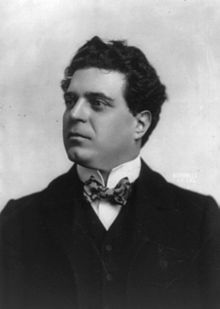
Pietro Mascagni
Saturdee Opry Links Overture
The lovely Barcarolle from "Silvano," by Mascagni.
https://www.youtube.com/watch?v=vEhSUYEXwAk
1.
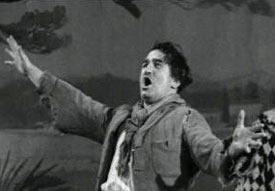
Thomas Burke
Thomas Burke is a long-forgotten tenor who, as is the
case with so many singers, has a renewed presence due entirely to Youtube.
Burke is not the greatest tenor who ever lived, but he was plenty good
enough to sing major Puccini and Verdi roles at the Royal Opera, and to tour
the U.S. in the '20's as an "Irish Tenor." (He was British, of Irish
descent.) The most important thing about his voice, and I expect he would
agree, is that it got him out of a horrid coal mine, where he went to work
at age 14. Having displayed natural musical talent on instrument and voice,
he subbed for an ill tenor in a local "Messiah," and that was all she wrote
for digging coal. He trained in Italy---you'll hear the Italian "sob"
several times in this aria---and for a while was known as "the Lancashire
Caruso." Mr. Burke apparently stopped singing in the late '30's---bios have
reports of "womanising and drinking," what a shock---dying in relative
obscurity in 1969. Here is a 1932 Pathe film of him in his prime, singing "E Lucevan Le
Stelle," from Puccini's "Tosca." The aria begins around the 3:00 mark.
https://www.youtube.com/watch?v=ZgQ1upHF_Z8
Setting: The ramparts of a fortress
Synopsis: Cavaradossi trades his last possession, a ring, to get a guard to
take a letter to the imprisoned Tosca. As he writes the letter, he sings of
his love for Tosca and for life.
Translation:
http://www.aria-database.com/search.php?individualAria=305
SOL EXTRA! Here is a marvelous article about Burke:
EXCERPT: Left to his wayward ways, Tom regularly made the headlines with his
drinking and womanising. There had to be questions about his judgement.
Would any sensible person pick a quarrel over a pretty girl with Jack
Dempsey, the undisputed ex-world heavyweight boxing champion who was known
as the Manassa Mauler? Or cross a Mafia boss in a dispute involving another
woman; an altercation that left Burke in hospital with a gunshot wound and a
compelling urge to get out of town?
http://northernlifemagazine.co.uk/tom-burke/
2.
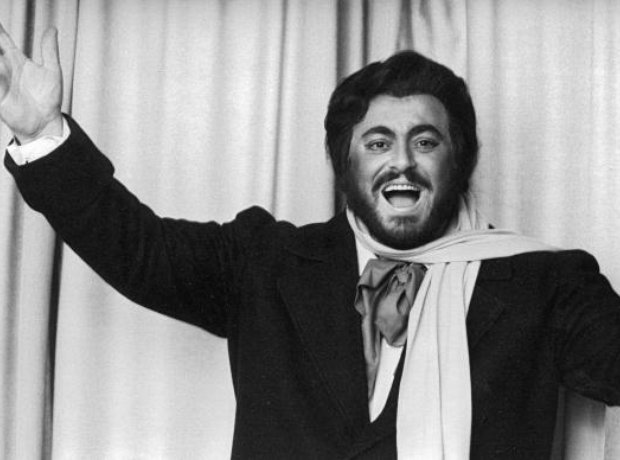
Luciano Pavarotti
And now to a better-known tenor, for obvious reasons.
Luciano Pavarotti sings the gorgeous, wrenching "Lamento de Federico," from
"L'Arlesiana," by Cilea. When his voice still had that bright
young sheen.
Setting: on the banks of Vacares pond in the region of Camargue, the end of
May, late 1800's, Italy
Synopsis: Federico has run away from home after finding out that his beloved
girl from Arles has betrayed him with the stable boy. He is found by
Baldassarre and L'Innocente but the former leaves to tend the flocks and the
latter falls asleep. As L'Innocente falls asleep, he mentions a line from a
story told earlier about a goat. This comment sets off Federico and he
despairs over his lost love.
https://www.youtube.com/watch?v=SOQ--4kTNf0
Translation:
http://www.aria-database.com/search.php?individualAria=305
3.
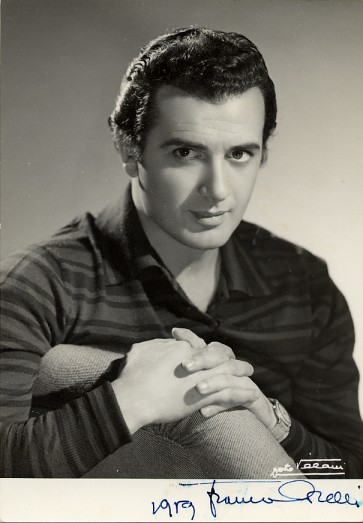
Franco Corelli
Turning to lighter fare for a moment, here is a
wonderful Neopolitan love song, "I Te Vurria Vasa," by Eduardo Di Capua. How
is it that Neopolitan songs all have a similarly wistful quality? Something
in the Naples water? The great
Franco Corelli, from a 1961 recording. (Nice paintings of Napoli accompany
the song.)
https://www.youtube.com/watch?v=aB6tr0cnuAU&feature=share
Translation:
https://www.italyheritage.com/italian-songs/regional/campania/i-te-vurria-vasa.htm
3.
Poor Butterfly. Poor Pinkerton, even (never mind that
he is a scoundrel.) They are both victims of rapture perhaps born in
fascination for what scholars like to call "the other." But Butterfly's
rapture is sincere, a declaration of absolute commitment, while Pinkerton is
merely smitten, overwhelmed by her beauty, and the beauty of her world.
Recipe for success? Methinks not. Here is their moment of transitory bliss,
so astoundingly dreamed up by Puccini. Placido Domingo and Mirella Freni.
https://www.youtube.com/watch?time_continue=86&v=htaixsdRXl0
Translation: (search for "Vogliatem")
http://www.murashev.com/opera/Madama_Butterfly_libretto_English_Italian
EXTRA: And here is a rare item: the great Luis Lima and
Yasuko Hayashi with the same duet, from 1980. I had the pleasure of seeing
Lima with the New York City Opera in a 1977 (or so) "La Boheme," during the
short time he was in brilliant voice. Wonderful!
https://www.youtube.com/watch?v=VNkW1pwVDgg
4.

Yasuko Hayashi
There is not too much on-line about soprano Yasuko
Hayashi, other than she debuted at La Scala in 1972 and made something of a
career out of Cio-Cio San from Puccini's "Madama Butterfly." (She is still
with us at 71.) She seems to have been a lirico spinto, with a smallish
voice that surprises with real power and body on the big notes. Rather
perfect for "Butterfly" (which she played in a La Scala-produced DVD
intended to showcase "authentic orientalism.") Here she is with the
immortal, "Un bel di vedremo," from "Butterfly," in which she imagines the
"fine day" that her beloved Pinkerton will return.
https://www.youtube.com/watch?v=EeLEIxZ-TpU
Synopsis : Three years have passed since Butterfly's
American husband left her. Her servant Suzuki, tries to convince her that he
isn't coming back, but Butterfly is convinced that he will. She sings of the
day that he will return. She dreams of him sailing into the harbour and
climbing up the hill to meet her.
Translation:
https://en.wikipedia.org/wiki/Un_bel_d%C3%AC_vedremo
The DVD:
https://www.amazon.com/Madama-Butterfly-Yasuko-Hayashi/dp/B000GNOTZI
5.
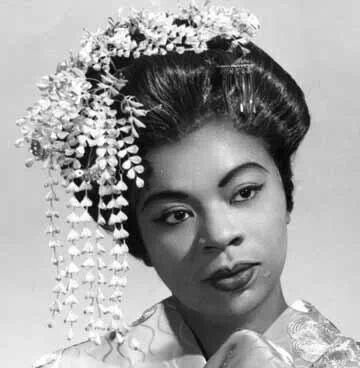
Martina Arroyo
Martina Arroyo's story is remarkable, as many operatic
success stories are, but hers is especially improbable. Grew up in Harlem,
BA in romance languages at 19, never thought she had a chance for an
operatic career because she was black. (This was the early 50's.) Became a
high school English teacher, but kept studying voice on the side. When that
proved overwhelming, she became a social worker, handling a caseload of over
100! The Met turned her down in '57, but she won a Met "Audition of the Air"
competition on radio, and was finally on her way. Still with us at 83, here is the
sumptuous, radiant voice of Ms. Arroyo with "O Patria Mia" from Verdi's
"Aida."
https://www.youtube.com/watch?v=wSokItQ45BU
Setting: The banks of the Nile
Synopsis: It is the eve of Amneris' wedding to Radamès and Aida has come to
the banks of the nile near the temple to meet Radamès. She mourns her
homeland which she will never see again.
Translation:
http://www.aria-database.com/search.php?individualAria=6
About Ms. Arroyo:
https://en.wikipedia.org/wiki/Martina_Arroyo
Interview with Ms. Arroyo, 2017:
https://www.youtube.com/watch?v=g2DTCsTlMZs
6.
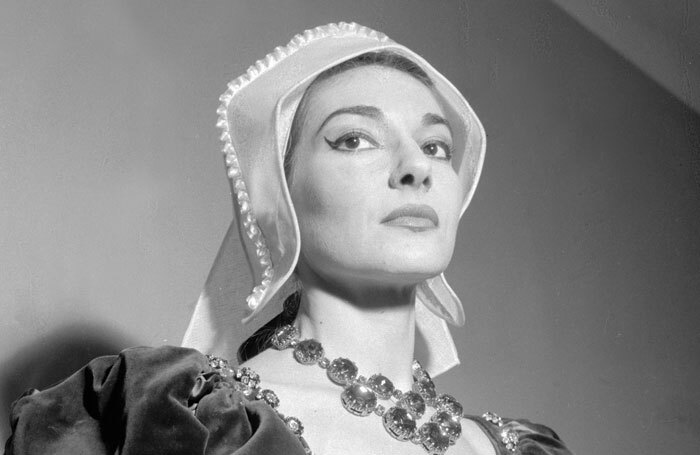
Maria Callas as Anna Bolena
From exquisite to more exquisite. Here is Maria Callas with the lilting,
delicate, heart-rending "Al dolce guidami," from "Anna Bolena," by
Donizetti. Anne Boleyn's last words. . .Did anyone sing this more
convincingly than Callas?
https://www.youtube.com/watch?v=kbJNZBMCiPQ&feature=share
Translation:
Lead me to the dear castle
where I was born,
to the green plane trees,
to that brook that still
murmurs to our sighs...
Ah!
there I forget Past griefs;
give me back one day of my youth,
give me back one day of our love.
Lead me to the dear castle
where I was born;
give me back one day
of our love..
just one single day of our love.
Italian:
Al dolce guidami castel natio,
ai verdi platani, al quello rio,
che i nostri mormora
sospiri ancor.
Ah! colà, dimentico
de' scorsi affanni,
un giorno rendimi
de' miei primi'anni,
un giorno sol del nostro amor
Al dolce guidami castel natio,
un giorno rendimi
del nostro amor...
on giorno sol del nostro,
del nostro amor.
7.
From the sublime to the ridiculous, here is Callas with
Rossini's de facto paean to uh, oh, feminine tenacity, let's call it. "Una
Voce Poco Fa," from "The Barber of Seville." There was nothing this woman
could not sing. Remember, she began as weighty (literally and figuratively)
Wagnerian soprano---yet here she is, waifish, assaying coloratura runs
with butterfly-ish grace. This is fun to watch, let alone hear.
https://www.youtube.com/watch?v=kG0BIOgl-aQ
Setting: A room in Dr. Bartolo's house
Synopsis: After having read the letter from Lindoro
(Count Almaviva), Rosina is filled with joy. She sings of her love for him.
And what she will do if it is threatened.
Translation:
http://www.aria-database.com/search.php?individualAria=25
8.
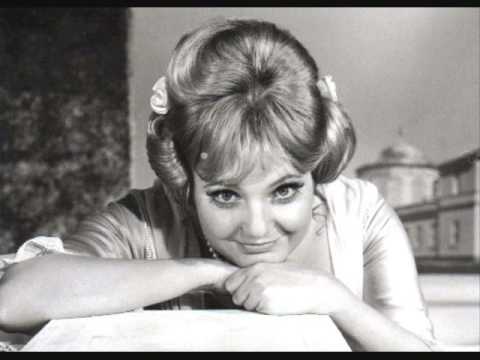
Lucia
Popp
So many voices, so many arias, so little time. This is
Lucia Popp's last recording before her tragic early death from brain cancer
in 1993. (She was 54.) She was widely regarded as without peer as a Mozart
soprano. While I lack the expertise to comment on that, I love her singing,
especially the rich lower and mid-range, and how her upper register seems
organic to the overall voice, as opposed to sounding mechanical, added-on,
even forced. Here she sings "Non Piu di Fiori," from "La Clemenza di Tito,"
Mozart's improbably sober final opera.
https://www.youtube.com/watch?v=__ENMyexMaM
Synopsis: Vitellia is in love with Emperor Titus. He loves another, so she
induces Sextus, a friend of Emperor Titus who is in love with her, to murder
Titus. Sextus does not succeed and is imprisoned, and she realizes that she
must tell the emperor that she asked him to commit the crime, since Sextus
is prepared to die for her if she does not. She realizes that she must
abandon her hopes for the throne and marriage to Titus by telling the truth.
Translation:
http://www.aria-database.com/search.php?individualAria=1189
9.
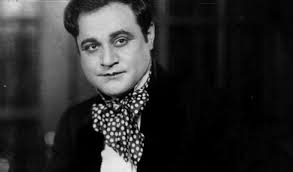
Beniamino Gigli
FINAL BOW:
Back to bread-and-butter tenors. The great Beniamino Gigli (think I'll
change my name to Beniamino) with the impassioned Neopolitan chestnut (what?
chestnuts can be impassioned?), "Core 'Ngrato." ("Ungrateful Heart.")
"Ungrateful heart,
you wrenched my life from me
and now it's all over,
you no longer think of me!"
https://www.youtube.com/watch?v=mNhaAXfTSLI
Translation:
https://www.lieder.net/lieder/get_text.html?TextId=4018
Back to Opera Links
Back to Home Page
|



